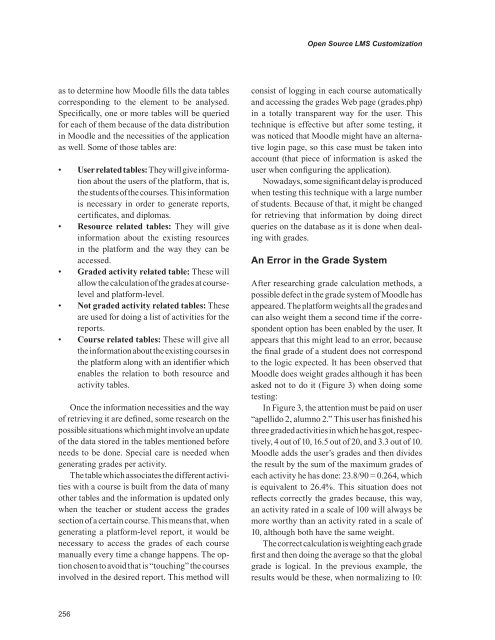Advances in E-learning-Experiences and Methodologies
You also want an ePaper? Increase the reach of your titles
YUMPU automatically turns print PDFs into web optimized ePapers that Google loves.
Open Source LMS Customization<br />
as to determ<strong>in</strong>e how Moodle fills the data tables<br />
correspond<strong>in</strong>g to the element to be analysed.<br />
Specifically, one or more tables will be queried<br />
for each of them because of the data distribution<br />
<strong>in</strong> Moodle <strong>and</strong> the necessities of the application<br />
as well. Some of those tables are:<br />
• User related tables: They will give <strong>in</strong>formation<br />
about the users of the platform, that is,<br />
the students of the courses. This <strong>in</strong>formation<br />
is necessary <strong>in</strong> order to generate reports,<br />
certificates, <strong>and</strong> diplomas.<br />
• Resource related tables: They will give<br />
<strong>in</strong>formation about the exist<strong>in</strong>g resources<br />
<strong>in</strong> the platform <strong>and</strong> the way they can be<br />
accessed.<br />
• Graded activity related table: These will<br />
allow the calculation of the grades at courselevel<br />
<strong>and</strong> platform-level.<br />
• Not graded activity related tables: These<br />
are used for do<strong>in</strong>g a list of activities for the<br />
reports.<br />
• Course related tables: These will give all<br />
the <strong>in</strong>formation about the exist<strong>in</strong>g courses <strong>in</strong><br />
the platform along with an identifier which<br />
enables the relation to both resource <strong>and</strong><br />
activity tables.<br />
Once the <strong>in</strong>formation necessities <strong>and</strong> the way<br />
of retriev<strong>in</strong>g it are def<strong>in</strong>ed, some research on the<br />
possible situations which might <strong>in</strong>volve an update<br />
of the data stored <strong>in</strong> the tables mentioned before<br />
needs to be done. Special care is needed when<br />
generat<strong>in</strong>g grades per activity.<br />
The table which associates the different activities<br />
with a course is built from the data of many<br />
other tables <strong>and</strong> the <strong>in</strong>formation is updated only<br />
when the teacher or student access the grades<br />
section of a certa<strong>in</strong> course. This means that, when<br />
generat<strong>in</strong>g a platform-level report, it would be<br />
necessary to access the grades of each course<br />
manually every time a change happens. The option<br />
chosen to avoid that is “touch<strong>in</strong>g” the courses<br />
<strong>in</strong>volved <strong>in</strong> the desired report. This method will<br />
consist of logg<strong>in</strong>g <strong>in</strong> each course automatically<br />
<strong>and</strong> access<strong>in</strong>g the grades Web page (grades.php)<br />
<strong>in</strong> a totally transparent way for the user. This<br />
technique is effective but after some test<strong>in</strong>g, it<br />
was noticed that Moodle might have an alternative<br />
log<strong>in</strong> page, so this case must be taken <strong>in</strong>to<br />
account (that piece of <strong>in</strong>formation is asked the<br />
user when configur<strong>in</strong>g the application).<br />
Nowadays, some significant delay is produced<br />
when test<strong>in</strong>g this technique with a large number<br />
of students. Because of that, it might be changed<br />
for retriev<strong>in</strong>g that <strong>in</strong>formation by do<strong>in</strong>g direct<br />
queries on the database as it is done when deal<strong>in</strong>g<br />
with grades.<br />
An error <strong>in</strong> the grade system<br />
After research<strong>in</strong>g grade calculation methods, a<br />
possible defect <strong>in</strong> the grade system of Moodle has<br />
appeared. The platform weights all the grades <strong>and</strong><br />
can also weight them a second time if the correspondent<br />
option has been enabled by the user. It<br />
appears that this might lead to an error, because<br />
the f<strong>in</strong>al grade of a student does not correspond<br />
to the logic expected. It has been observed that<br />
Moodle does weight grades although it has been<br />
asked not to do it (Figure 3) when do<strong>in</strong>g some<br />
test<strong>in</strong>g:<br />
In Figure 3, the attention must be paid on user<br />
“apellido 2, alumno 2.” This user has f<strong>in</strong>ished his<br />
three graded activities <strong>in</strong> which he has got, respectively,<br />
4 out of 10, 16.5 out of 20, <strong>and</strong> 3.3 out of 10.<br />
Moodle adds the user’s grades <strong>and</strong> then divides<br />
the result by the sum of the maximum grades of<br />
each activity he has done: 23.8/90 = 0.264, which<br />
is equivalent to 26.4%. This situation does not<br />
reflects correctly the grades because, this way,<br />
an activity rated <strong>in</strong> a scale of 100 will always be<br />
more worthy than an activity rated <strong>in</strong> a scale of<br />
10, although both have the same weight.<br />
The correct calculation is weight<strong>in</strong>g each grade<br />
first <strong>and</strong> then do<strong>in</strong>g the average so that the global<br />
grade is logical. In the previous example, the<br />
results would be these, when normaliz<strong>in</strong>g to 10:


